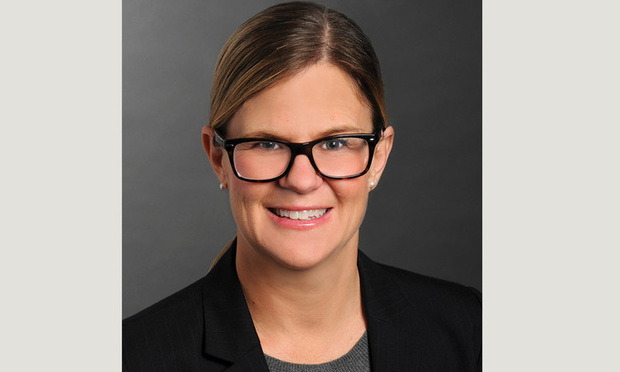California Responds to the #MeToo Movement With Sweeping Legislation
Breaking in October 2017, the Harvey Weinstein story sparked the #MeToo movement and California's legislature responded swiftly. In 2018, Governor Brown approved a number of significant pieces of legislation that require action by employers in 2019 and that will change how sexual harassment cases are litigated.
January 03, 2019 at 04:55 PM
8 minute read
 Tiffanny Brosnan, partner with Snell & Wilmer.
Tiffanny Brosnan, partner with Snell & Wilmer.
Breaking in October 2017, the Harvey Weinstein story sparked the #MeToo movement and California's legislature responded swiftly. In 2018, Governor Brown approved a number of significant pieces of legislation that require action by employers in 2019 and that will change how sexual harassment cases are litigated.
SB 826—Requires female board members for public companies
According to the prelude for Senate Bill 826, “One-fourth of California's public companies … have NO women on their boards of directors; and for the rest of the companies, women hold only 15.5 percent of the board seats.” Yet, according to studies cited in the prelude, companies with women on their boards have higher average return on equity than companies with no female board members, and companies with women on their boards significantly outperformed others when the recession hit. Relying on statistics and studies such as these, California enacted Senate Bill 826 to require that by the end of 2019, all publicly held corporations whose principle executive offices are in California have at least one woman on their board of directors. That number will increase on a going-forward basis depending on the size of the board.
• By the end of 2021, for a board with
- Six or more directors, there must be at least three women;
- Five or more directors, there must be at least two women; and
- Four or fewer directors, there must be at least one woman.
This bill allows for harsh punishment in the event of a violation, permitting the Secretary of State to impose a fine of $100,000 for the first violation, and $300,000 for a subsequent violation.
AB 2770—Protects complaints and communications related to sexual harassment
In 2018, victims of sexual harassment broke their silence and explained that previously they were afraid to report the harassment because of the repercussions they would face. We hear stories of the alleged harassers suing the victims, claiming that they were defamed by the victim's complaint. California's Assembly Bill 2770 now provides a layer of protection, making clear that certain complaints and communications regarding sexual harassment are not defamatory.
• Assembly Bill 2770 makes privileged—and not defamatory—the following communications:
- Complaints of sexual harassment by an employee, without malice, to an employer based on credible evidence;
- Communications between employers and interested persons, without malice, regarding a complaint of sexual harassment; and
• When responding to reference checks, this bill authorizes employers to answer, without malice, whether or not the employer would rehire an employee, and whether the decision to not rehire is based on the employer's determination that the employee engaged in sexual harassment.
SB 1300—Prohibits certain releases and non-disparagement agreements relating to sexual harassment
Senate Bill 1300 also protects employees' rights to talk about sexual harassment and to bring sexual harassment claims. This bill prohibits employers from requiring employees to:
• Release harassment or discrimination claims under California's Fair Employment and Housing Act in exchange for a raise or bonus or as a condition of hire or continuing employment; and
• Sign non-disparagement agreements or other documents preventing employees from disclosing information about unlawful acts in the workplace, including sexual harassment.
SB 1300—Makes it more difficult for employers to defend sexual harassment claims
Traditionally, employers have been able to get sexual harassment cases dismissed by relying on a long history of case law and arguing that a single incident of harassment, or a “stray remark” is not sufficient to constitute sexual harassment under the law. Employers have also argued that the workplace should be taken into account when determining whether conduct rises to the level of sexual harassment (e.g., the locker room is different than the board room). Senate Bill 1300 legislates around the case law precedent and declares that for purposes of motions to dismiss sexual harassment cases (“summary judgment motions”):
• A single incident of harassing conduct is sufficient to defeat summary judgment;
• The “stray remarks” doctrine is rejected, and a discriminatory remark, even if not made directly in the context of an employment decision or uttered by a non-decisionmaker, may be relevant evidence in a harassment claim;
• The standard for assessing sexual harassment does not vary by workplace; and
• “Harassment cases are rarely appropriate for disposition on summary judgment.”
SB 820—Prohibits confidential settlements of sexual harassment claims
Employers have been criticized for keeping sexual harassment claims and settlements confidential, with victims' advocates claiming that this practice protects the harassers. In response, California enacted Senate Bill 820 which restricts this practice. Now,
• Any provision in a settlement agreement that prevents the disclosure of factual information related to a claim filed in a civil action or a complaint filed in an administrative action regarding the following is prohibited:
- An act of sexual assault;
- An act of sexual harassment; and
- An act of workplace harassment or discrimination based on sex, or failure to prevent an act of workplace harassment or discrimination based on sex, or an act of retaliation against a person for reporting harassment or discrimination based on sex.
SB 1300—Makes it more difficult for an employer who prevails in a sexual harassment case to recover its fees
Courts have discretion to award attorney's fees and costs to a plaintiff who wins a sexual harassment case. Previously, courts also had discretion to award attorney's fees and costs to an employer who wins a sexual harassment case. Senate Bill 1300 now makes that more difficult for prevailing employers. It is not enough for the employer to win the case. Now, in order to award attorney's fees and costs to a prevailing employer, the court must find that the action was frivolous, unreasonable or groundless when brought, or that the plaintiff continued to litigate the case after it clearly became so.
SB 1343—Makes sexual harassment training mandatory for more employers and more employees
Previously, large employers in California (50 or more employees) were required to provide two hours of sexual harassment training to all supervisors within six months of becoming a supervisor and every two years thereafter. The training can only be provided by certain trainers, and there are very specific requirements for what must be included in the training. In 2019, these requirements will expand to smaller employers and to more employees.
• Employers with five or more employees must provide:
- The two hours of sexual harassment training to all supervisory employees by the end of 2019;
- One hour of sexual harassment training to all nonsupervisory employees by the end of 2019;
• The training for supervisors and non-supervisors must be provided every two years thereafter, and within six months of an employee becoming a supervisor and six months after hire for a non-supervisor.
And Don't Forget …
This represents only what is new in 2019. There are pre-existing requirements for California employers that are not going away. For example, employers must take reasonable steps to prevent and promptly correct harassment. This includes: (1) having a written sexual harassment policy that meets all of the requirements under California law and that is distributed to all employees; and (2) using qualified personnel to timely investigate complaints of harassment.
Finally, there were several bills that made their way through the legislature but were vetoed by Governor Brown. These include a bill to prohibit employers from requiring that employees arbitrate claims of harassment and discrimination, and a bill that extends the time within which an employee can file a complaint of harassment. California will have a new governor in 2019 and this could mean a different approach to legislation such as that discussed here.
Tiffanny Brosnan is a partner in the Orange County office of the law firm Snell & Wilmer. Tiffanny's practice is concentrated in employment litigation and counseling.
This content has been archived. It is available through our partners, LexisNexis® and Bloomberg Law.
To view this content, please continue to their sites.
Not a Lexis Subscriber?
Subscribe Now
Not a Bloomberg Law Subscriber?
Subscribe Now
NOT FOR REPRINT
© 2025 ALM Global, LLC, All Rights Reserved. Request academic re-use from www.copyright.com. All other uses, submit a request to [email protected]. For more information visit Asset & Logo Licensing.
You Might Like
View All

California’s Workplace Violence Laws: Protecting Victims’ Rights in the Workplace
6 minute read

'Nothing Is Good for the Consumer Right Now': Experts Weigh Benefits, Drawbacks of Updated Real Estate Commission Policies
Trending Stories
- 1Fulton DA Seeks to Overturn Her Disqualification From Trump Georgia Election Case
- 2The FTC’s Noncompete Rule Is Likely Dead
- 3COVID-19 Vaccine Suit Against United Airlines Hangs on Right-to-Sue Letter Date
- 4People in the News—Jan. 10, 2025—Lamb McErlane, Saxton & Stump
- 5How I Made Partner: 'Be Open With Partners About Your Strengths,' Says Ha Jin Lee of Sullivan & Cromwell
Who Got The Work
Michael G. Bongiorno, Andrew Scott Dulberg and Elizabeth E. Driscoll from Wilmer Cutler Pickering Hale and Dorr have stepped in to represent Symbotic Inc., an A.I.-enabled technology platform that focuses on increasing supply chain efficiency, and other defendants in a pending shareholder derivative lawsuit. The case, filed Oct. 2 in Massachusetts District Court by the Brown Law Firm on behalf of Stephen Austen, accuses certain officers and directors of misleading investors in regard to Symbotic's potential for margin growth by failing to disclose that the company was not equipped to timely deploy its systems or manage expenses through project delays. The case, assigned to U.S. District Judge Nathaniel M. Gorton, is 1:24-cv-12522, Austen v. Cohen et al.
Who Got The Work
Edmund Polubinski and Marie Killmond of Davis Polk & Wardwell have entered appearances for data platform software development company MongoDB and other defendants in a pending shareholder derivative lawsuit. The action, filed Oct. 7 in New York Southern District Court by the Brown Law Firm, accuses the company's directors and/or officers of falsely expressing confidence in the company’s restructuring of its sales incentive plan and downplaying the severity of decreases in its upfront commitments. The case is 1:24-cv-07594, Roy v. Ittycheria et al.
Who Got The Work
Amy O. Bruchs and Kurt F. Ellison of Michael Best & Friedrich have entered appearances for Epic Systems Corp. in a pending employment discrimination lawsuit. The suit was filed Sept. 7 in Wisconsin Western District Court by Levine Eisberner LLC and Siri & Glimstad on behalf of a project manager who claims that he was wrongfully terminated after applying for a religious exemption to the defendant's COVID-19 vaccine mandate. The case, assigned to U.S. Magistrate Judge Anita Marie Boor, is 3:24-cv-00630, Secker, Nathan v. Epic Systems Corporation.
Who Got The Work
David X. Sullivan, Thomas J. Finn and Gregory A. Hall from McCarter & English have entered appearances for Sunrun Installation Services in a pending civil rights lawsuit. The complaint was filed Sept. 4 in Connecticut District Court by attorney Robert M. Berke on behalf of former employee George Edward Steins, who was arrested and charged with employing an unregistered home improvement salesperson. The complaint alleges that had Sunrun informed the Connecticut Department of Consumer Protection that the plaintiff's employment had ended in 2017 and that he no longer held Sunrun's home improvement contractor license, he would not have been hit with charges, which were dismissed in May 2024. The case, assigned to U.S. District Judge Jeffrey A. Meyer, is 3:24-cv-01423, Steins v. Sunrun, Inc. et al.
Who Got The Work
Greenberg Traurig shareholder Joshua L. Raskin has entered an appearance for boohoo.com UK Ltd. in a pending patent infringement lawsuit. The suit, filed Sept. 3 in Texas Eastern District Court by Rozier Hardt McDonough on behalf of Alto Dynamics, asserts five patents related to an online shopping platform. The case, assigned to U.S. District Judge Rodney Gilstrap, is 2:24-cv-00719, Alto Dynamics, LLC v. boohoo.com UK Limited.
Featured Firms
Law Offices of Gary Martin Hays & Associates, P.C.
(470) 294-1674
Law Offices of Mark E. Salomone
(857) 444-6468
Smith & Hassler
(713) 739-1250






